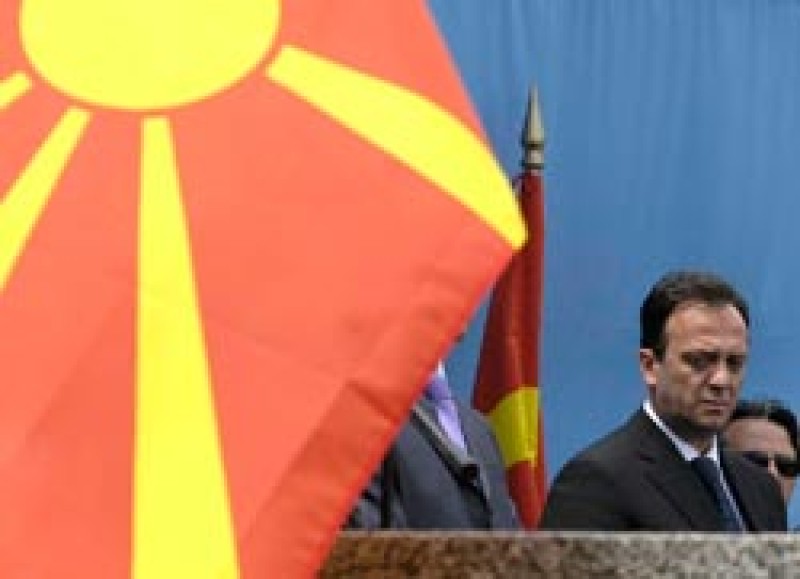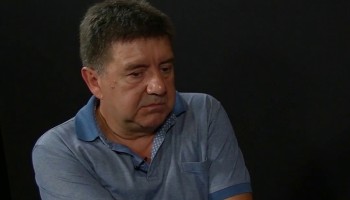Mijalkov, a career government official, is also quite wealthy. The Organized Crime and Corruption Reporting Project (OCCRP), together with NOVA TV in Macedonia and the Czech Center for Investigative Journalism, has found that Mijalkov has invested millions in expensive real estate in Prague.
Mijalkov, whose formal title is Macedonia's Chief of Administration for Security and Counter Intelligence, has a large number of unreported investments. As a public official, he is required to report them on asset declaration forms, yet he has not. Many of them are connected to other controversial businessmen and politicians.
In mid-February, OCCRP submitted questions on the following issues to Mijalkov's press office, but the promised answers have not arrived to date. Since March, he has sold one substantial property, in the Veleslavin district of the Czech capital.
The Paper Trail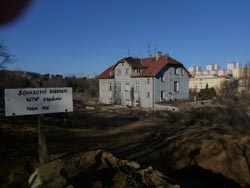 Veleslavín – The plot of land known as Strnadovy zahrady (Strnads gardens), is more than 50,000 square meters.
Veleslavín – The plot of land known as Strnadovy zahrady (Strnads gardens), is more than 50,000 square meters.
As a public servant, Mijalkov is required to file a statement detailing his wealth with Macedonia's Anticorruption Commission. The law also says he must report to the State Commission for Preventing Corruption any changes in his wealth that exceed the value of 20 average net salaries for the previous three months.
In the statement he filed, he fails to mention most of his holdings in Prague. He does list an apartment in Prague's Old Town and shares in a Czech-based company. OCCRP and its partners found at least US$ 2 million worth of real estate assets registered to his company, and to him personally, which he should have reported.
Property records show Mijalkov owned a 15,000-square-meter plot in the Veleslavin district of the Czech capital, prime piece of land valued at about US$ 1 million. In March, a large portion of it –about 11,000 square meters—was put on the market and subsequently sold. He also owns an apartment in Michle, Prague's business district.
The intelligence boss is also connected to a maze of companies, and, through them, to influential Czech and foreign businessmen.
According to Macedonian law, public officials can have private businesses while in office but they must declare all private interests and their wealth. The penalty for not doing so is a fine of €300-800 (US$ 412-1,100).
Mixing Business and Government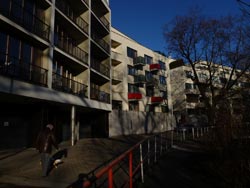 Michelský mlýn - A real estate development project of Sašo Mijalkov and the Sparavalo brothers.
Michelský mlýn - A real estate development project of Sašo Mijalkov and the Sparavalo brothers.
Now 48, Mijalkov started his government career in 1998, following in the footsteps of his powerful father, Jordan Mijalkov, who had been a leader in what was then the newly established state of Macedonia following the dissolution of Yugoslavia. The elder Mijalkov was the first Minister for Internal Affairs until 1991, when he died in a car accident.
The younger Mijalkov also took the reins of his father's business. In the 1980s, the senior Mijalkov was director of the Czech branch of the Macedonian textile company Makoteks, a company founded in 1949 and owned by the then-Yugoslav government. The Mijalkov family spent a lot of time in Prague.
Young Mijalkov's first job in the Macedonian government was as the assistant to the Minister of Defense for Security Intelligence, a position he held for two years starting in 1998. This was followed by two other government jobs also related to the defense and security of Macedonia. As Mijalkov's career unfolded, so did his businesses and holdings in the city of Prague.
In 2003, Mijalkov took a three-year break from state matters, only to return in 2006 as the chief of the Macedonian Secret Service. The new political environment in Macedonia, created after the VMRO DPMNE party came to power, proved to be very advantageous to MIjalkov. It led to the ascendency of "the Family" as locals call them, a trio of the most powerful politicians in the country: Mijalkov; his cousin, Prime Minister Nikola Gruevski; and Zoran Stavrevski, who is the Deputy Prime Minister, Minister of Finance and was the best man at Gruevski's wedding. On top of that, Mijalkov's brother, Vladimir, is advisor in the cabinet of the general director of Macedonian Customs.
Anti-corruption policy experts protested in vain against these appointments, which they called blatant conflicts of interest.
"This is an obvious situation of nepotism… It enables them to control all authorities, through the budget, and by using the mechanisms of the secret police," said Slagjana Taseva, the president of Transparency International (TI) Macedonia and First President of the Anticorruption Committee. "These links are very strong and over time they have gained great financial power – for them personally and for the party. It gives them total power to control all the mechanisms of democracy."
The Czech Companies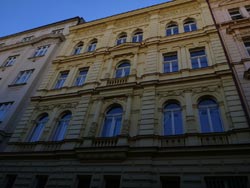 Betlémská - Apartment of Sašo Mijalkovs company Efficiency situated in Prague Old Town, Betlémská street #10.
Betlémská - Apartment of Sašo Mijalkovs company Efficiency situated in Prague Old Town, Betlémská street #10.
Mijalkov established his first Czech company in 1993 with his brother. They called it Mijalkov s.r.o before later changing the name to Efficiency s.r.o. Its stated goal was to work in the real estate business. Since 2008, Mijalkov has been the only shareholder. This company owns a luxury apartment in Prague's popular Old Town. According to property records, he bought it in 2001 for 360,000 Deutsch Mark, (about US$ 235,000).
Efficiency also owns 50 percent of the shares in another real estate business, Style Fashion s.r.o. Myrtlanis s.r.o., a third company, used to belong to Mijalkov but recently its ownership was transferred to a Panama-based company, Tasiga Corp.
Myrtlanis also used to own a 15,280-square-meter plot in the expensive Veleslavín district of Prague, but on Jan. 7, that was transferred to Mijalkov personally.
A fourth company, Service Point MM s.r.o., was dissolved in 2013 after it had built 50 luxury apartments in the Michle district of Prague. Mijalkov had provided the land where the apartments were built, an investment worth US$ 500,000, and consequently held 50 percent of the company's shares. Mijalkov owns a condominium in this apartment complex that he does not list in his official wealth statement.
The other half of the shares in Service Point MM were split between brothers Vojislav and Dejan Sparavalo, long-time partners of Mijalkov with good local connections.
Taseva of TI told OCCRP that having businesses abroad isn't necessarily a problem unless they are not reported and not transparent. "Doing business with offshore companies gives these companies the opportunity to perform activities such as illegal transfers and money laundering," Taseva said. "Disclosure of the names or real owners of such companies is desirable because (otherwise) such a situation can be used for illegal political funding. This is prohibited in Macedonia but there are no effective mechanisms that can enforce it."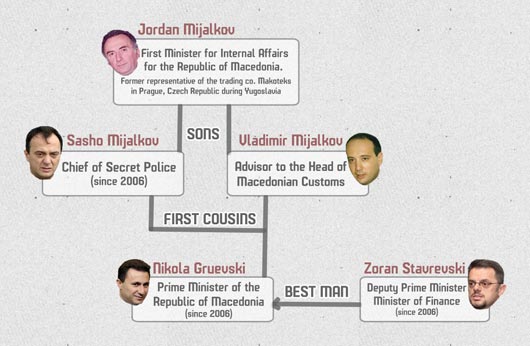
Goran Mincev, president of the Macedonian Parliament Committee for Control Over the Secret Service, said that there is a conflict even though Mijalkov claims his business interests are not a conflict and not illegal. "He as a director (of the intelligence agency), can follow communications, tap phones of businessmen, follow the stock market, (and) follow economic trends. Even though his business is outside Macedonia, the secret police cooperate with other foreign services. His power is immense," said Mincev.
Friends and Money
The Sparavalos, Mijalkov's main business partners in the Czech Republic, are connected to a wide range of businesses in that country. They have many things in common with Mijalkov. They used to have the same permanent residency address in the Prague district of Petřiny. They had companies registered at the same addresses and they all used to live in the same house. The Sparavalo brothers are heavily connected via other companies to other business tycoons from the former Yugoslavia.
Among them:
Milutin Perič, the undisputed leader of the Czech gambling industry who runs a network of casinos and slot machines.
Milorad Miškovič, a real estate developer linked through his contacts to high-profile Czech politicians.
Miodrag Maksimovič, a heavy investor in energy.
Thomas Samii, Thomas Samii, a New York-born lawyer turned real estate investor, who has business with a former Croatian general, Vladimir Zagorec and Milorad Miškovič.
Vojislav Sparavalo moved to Monaco in 2005, where he is now a permanent resident.
Fear and Litigation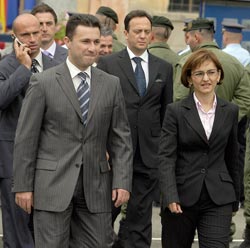 From left, Nikola Gruevski (in the striped tie); Sašo Mijalkov, and Gordana Jankulovska (Photo by Tomislav Georgiev)
From left, Nikola Gruevski (in the striped tie); Sašo Mijalkov, and Gordana Jankulovska (Photo by Tomislav Georgiev)
In the past few years, few Macedonians would talk about Sašo Mijalkov, but a change last year in the leadership of the opposition has changed things. Politicians and the general population are more willing now to discuss him in public.
They had reason to be fearful. He not only was chief of the secret police, he sued his critics left and right. He sued the Macedonian weekly "Fokus" for reporting a statement by the former Macedonian ambassador to the Czech Republic. Mijalkov was publically criticized for this by a UN special representative for freedom of expression who even called upon Mijalkov to withdraw from this case. "Fokus" lost and its chief editor and reporter on this story were ordered to pay Mijalkov €8,000 (US$ 10,500) including court fees.
In October 2007, Jani Makraduli, a member of the Macedonian Parliament, accused Mijalkov in a press conference of using his power and influence in order to do business.
Mijalkov took him to court and claimed that Makraduli's accusations had had a profound impact on him, producing "feelings of anxiety, depression, severe humiliation." He told the court he couldn't look into the eyes of his children and wife or sleep peacefully, and a psychiatrist said in court that the attack left Mijalkov unable to perform daily routines. Mijalkov won the case.
RELATED STORY - Money, power and phone recordings
Of the many controversies about the Macedonian secret service, the way it spends money is perhaps the biggest.
Over the past eight years, Sašo Mijalkov never appeared in person to report about his agency to the parliamentary committee that is supposed to monitor it.
Since 2006 the budget of the police has increased rapidly. Today the Ministry of Interior has one of the biggest budgets of all institutions – about US$ 218 million for 2014, of which about US$ 170 million is for security matters. Compare that to 2006, when the Ministry's entire budget was about US$ 146 million. For another comparison, the Ministry of Transport and Communication, in charge of all infrastructure projects like roads, railways, sewage, and gas lines, has a budget of about US$ 78 million.
Changes to the law have allowed the secret police to easily tap into citizens' communication with little or no paperwork or oversight. The opposition says Mijalkov controls the whole state.
Tito Petkovski, who presides over the Parliament's Committee for Supervising the Implementation of Measures to Monitor Communications formed by the Ministry of Interior and the Ministry of Defense, said, "After they changed the law, the secret police gained a lot of power. They are allowed to tape people for 48 hours without any kind of court order or any written approval--only with a phone call to a judge."
Petkovski said the oversight committee is not working.
"We do not have meetings, we do not pay visits to the Ministry of Interior. When the opposition leader Ljube Boskovski was arrested in 2011, the main evidence in court against him was phone taps made by the Ministry of Interior – the secret police," he said. "When we wanted to check on those tapes, the minister said that they do not have that kind of proof and that our visit won't help us ... Can you believe that?"
A European Commission progress report in 2010 blasted the Ministry of Interior for its policy of authorizing the use of interceptions, saying it was not in line with European Union (EU) standards and raised concerns about undue political interference. The criticism has continued in subsequent reports as well.
Concerns over the uncontrolled power of the secret police appear regularly in reports on the country's progress by the EU and international anti-corruption organizations.
Goran Mincev, president of the Parliament committee overseeing the secret service, said, "Their reports and their program are never on time; sometimes they are 10 months late. I have never had sufficient facts on the work of the secret police, facts that can make me confident in the legal operation of the secret police. To this day they have failed to submit a detailed budget on how they spend money."
Macedonia has been a candidate country for membership in the EU since 2005, and reports by the EU note these and other problems, as do reports from the US State Department and international oversight organizations. These reports and media point out widespread corruption, governmental control over the media, imprisoned journalists and political prisoners.
